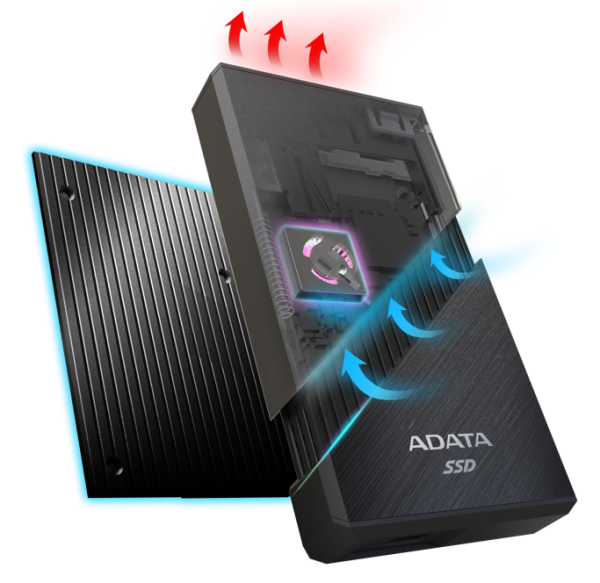Temperature:
There's no easy way to say this, but the SE920 gets pretty hot when plugged into a USB4 port. I'm not sure if it's the SSD controller, the USB4/Thunderbolt to PCIe/NVMe bridge chip or a combination of the two, but with the fan disabled, temperature hovered around 55 ºC at idle. When pushed hard, the SE920 reached temperatures as high as 72 ºC when reading and 71 ºC when writing. The outer casing was also hot to the touch, which is a good thing in some ways as it was doing its job of conducting heat away from the internal components.

To combat these high temperatures, the SE920 incorporates a unique heat dissipation system with a built-in micro fan. Simply press down on the case to activate the fan and increase the interior area for cooling. When done, press the case again to retract its shroud, making it easy to carry.

Needless to say, the SE920 heat dissipation system did reduce temperatures somewhat. Looking at the screenshot below, you can see that the drive idled at around 51 ºC and reached temperatures as high as 63 ºC when reading and 68 ºC when writing.

Final Thoughts:
With the SE920, ADATA has delivered one of the fastest and most technically advanced external SSDs on the market today. The drive is good looking, well constructed and is available with up to 2TB of NAND flash. The SE920 also features a USB4 Type-C interface and is backwards compatible with USB 3.2 and USB 2.0 as well as Thunderbolt 3/4. When it came time to perform, the drive did not disappoint. The 1TB version of the SE920 flew through our sequential transfer rate tests, reading at speeds as high as 3,101 MB/s and writing at more than 2,900 MB/s. It also did surprisingly well in our random write tests, producing more than 250,000 IOPS at low queue depths.
At these speeds, the SE920 does generate a good amount of heat. ADATA has tackled this problem head on, though, with an ingenious heat dissipation system. By simply pushing down on the SE920's case, you can activate the built-in micro fan and extend the chassis for better air circulation. When you're done, press the case again to retract the chassis to make it easier to carry. The downside to this cooling system is that, even with with the chassis retracted, the SE920 is larger and heavier than portable USB 3.2 SSDs. As a result, its not something you'd carry around in your pocket, but should be right at home in your laptop bag or backpack.
The SE920 is not available from large U.S. retailers like Newegg or Amazon quite yet. However, using websites like Geizhals, we can get an idea of how much it may cost by looking at prices in Europe. Using this data we can see that the 1TB and 2TB capacity drives currently retail for €157 (~$171) and €233 (~$254), respectively, which is $50 to $100 more than USB 3.2 2x2 drives like the Crucial X10, Kingston XS2000 or ADATA's own SE880.

Highs:
- USB4 40Gbs USB-C interface
- Active heat dissipation system with built-in micro fan
- Available in 1TB and 2TB capacities
- Excellent sequential and random read and write speeds
- Backwards compatible with USB 3.2, USB 2.0 and Thunderbolt 3/4
- Works with ADATA's SSD Toolbox software
- Supports Windows, Mac OS, Android, Xbox, PS4 and PS5
- 5 year warranty
Lows:
- Larger than many other external SSDs
- Can still get hot even with fan enabled
- Pricey

